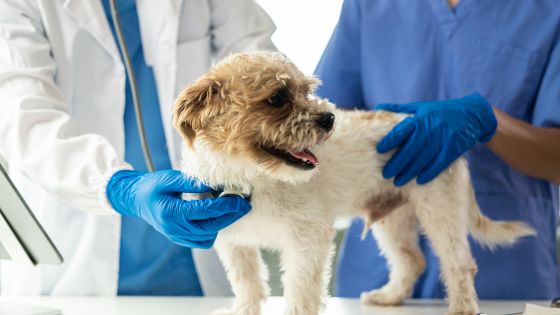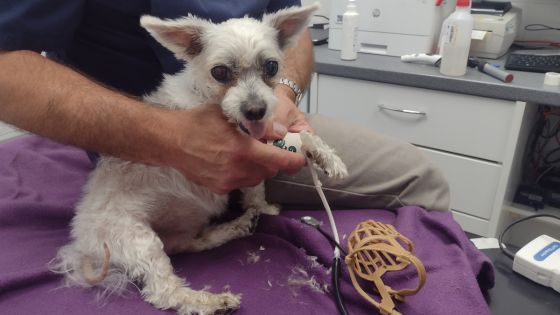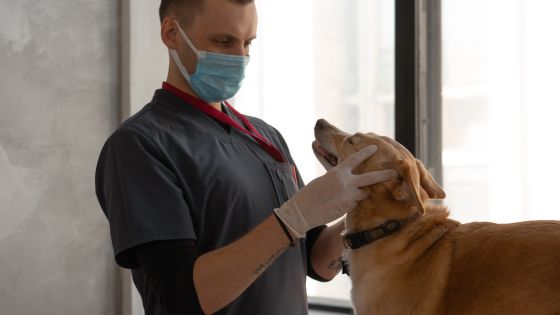As your dog ages, regular vet visits become more important than ever. Preventative care can catch potential health issues early, allowing for more effective treatments and helping your dog live a longer, more comfortable life.
Senior dogs are at a higher risk for age-related conditions, so routine checkups are the best way to stay ahead of any concerns.
When is a Dog Considered a Senior?
The age at which a dog is considered senior depends on its size and breed. Generally:
🐶 Small breeds (under 20 lbs): senior at 10-12 years
🐶 Medium breeds (20–50 lbs): senior at 8-10 years
🐶 Large breeds (50–90 lbs): senior at 7-8 years
🐶 Giant breeds (over 90 lbs): senior at 5-6 years
How Often Should Senior Dogs See the Vet?
For most senior dogs, every six months is the standard recommendation for routine vet visits. This allows your vet to:
- Monitor chronic conditions like arthritis, kidney disease or diabetes
- Adjust diet or medications
- Track weight changes
- Catch early signs of cancer or organ failure
- Keep vaccines and preventatives current
More frequent visits are usually required if your dog:
- Has a chronic illness
- Is on long-term medication
- Shows signs of cognitive decline or mobility issues
- Experiences sudden behavioral changes
How to Get the Most out of Your Visits
Depending on your vet, you may have all the time in the world or they’re watching the clock tick. Either way, before your appointment I highly recommend you make notes of any concerns you have, changes you’ve been noticing or questions you’d like answered….and don’t forget to bring them with you!

What Does a Senior Dog Wellness Check Entail?
It’s typically more thorough than a regular adult dog check, especially if your vet is already monitoring existing conditions.
General catch Up
Our vet appointments always start with a bit of a catch up. What’s been going on, any changes, how’s the appetite, mobility and of course any questions specifically related to a condition we may be monitoring.
Full physical exam
Heart and lung health – coughs or breathing issues.
Dental check – dental disease can cause painful infections, and untreated periodontal disease can lead to heart or kidney problems.
If your vet, recommends dental surgery please don’t say no without hearing him out first. I understand the concern about putting an old dog under anesthesia, but let him explain the pros and cons of the surgery and any potential risks. Only then can you make an informed decision.
Joint health & mobility assessment – looking for signs of joint stiffness, swelling, or discomfort.
Vision & hearing checks – signs of cataracts, glaucoma, retinal disease, hearing loss, ear infection(s).
Depending on what your vet finds, a referral to an eye specialist may be the best course of action. I would also make that happen rather quickly, as an eye issue can be very time sensitive.
I have a wonderful vet, but when my dog developed an ulcer we headed straight to an eye hospital, and they saved his sight.
Cancer screenings – lumps or bumps are pretty common in senior dogs, and although they’re often just fluid filled and nothing to worry about…sometimes they are.
Blood work – check for things like liver or kidney disease, diabetes and general organ function. They’re also used to compare to previous results as a way to monitor your dog’s overall health or a particular condition.
Urinalysis – consider bringing a sample with you, call your vet’s office and ask what their collection advice is. My vet says first pee of the day, mid stream, and drop off within 2 hours. If that doesn’t work with your appointment time, ask if you can drop it off beforehand. They can usually do a basic test in the practice, which could give your vet enough information to start with.
Weight and body condition – sadly many old dogs are overweight because they aren’t taken out for enough exercise, or mobility issues are not being dealt with. On the other hand, weight loss can indicate some health challenges so being able to see a trend is very important.
Vaccines and parasite prevention – flea, tick and heartworm prevention are very important, but not all senior dog parents agree with vaccinating their dog. I suggest you research the pros and cons and chat with your vet.
Other Tests Your Vet May Recommend
X-rays and/or ultrasound – used to investigate a variety of concerns including heart, mobility or bladder for instance. These diagnostic tools go a long way to help with a definitive diagnosis.

Blood pressure check – I never knew dogs could have high blood pressure, until I found out Jack did. They literally use a mini blood pressure cuff, just like they do with humans. You can see that in the picture above.
Signs Your Senior Dog Might Need More Frequent Vet Visits
Even if your senior dog is on a regular checkup schedule, don’t wait for the next appointment if you notice:
❗Eating or drinking more or less
❗Sudden weight loss or gain
❗Behavior changes such as irritability, lethargy or confusion
❗Difficulty standing or walking
❗Vomiting, diarrhea, accidents in the house
❗Coughing, panting excessively or trouble breathing
❗Bad breath or dental pain
Early intervention can make a huge difference in your dog’s comfort and quality of life, so if you notice any of these signs, schedule a vet visit as soon as possible.
Vet Care Beyond Physical Health
Along with physical exams, mental health care is important for senior dogs. If your dog shows signs of anxiety, confusion, or aggression, talk to your vet about options for managing these issues.
Hearing and/or vision loss, pain and dementia are possible explanations for these changes. Thankfully there are medications and supplements that can help, as well as tips and advice in the articles below.
How to Tell if Your Dog is Deaf
A Guide to Caring for Your Blind Dog
5 Effective Ways to Reduce Pain in Dogs with Arthritis
A Comprehensive Guide to Dog Dementia

Final Thoughts
Preventative health checks and regular screenings are vital for senior dogs. Early detection of age-related diseases or health conditions can lead to more effective treatments and help your dog live a longer, more fulfilling life.
By staying proactive and working closely with your vet, you’ll be ensuring your older pup lives their golden years with as much comfort, health, and happiness as possible.
How often do you take your senior dog to the vet? How thorough do you find the checkup? Share your tips in the comments!
Aging Pet Support
“I’m a dedicated senior dog care consultant, here to help first-time senior dog parents navigate this special stage of their pup’s life with confidence and love. From health tips to daily care advice, I provide the guidance and support you need to ensure your aging dog stays happy, comfortable, and cherished every step of the way! 🐶❤️”
Click this link to book a FREE 20 minute discovery call.
I’ve been rescuing and caring for senior dogs since 2009. From vision and hearing loss to obesity, dementia, kidney disease, liver issues, cardiac problems, Cushing’s, mobility challenges and more, you could say I’ve dealt with and learned a lot! In addition to my hands on experience, I’ve taken many courses and earned several qualifications to keep learning how to help senior dogs and they include: Senior Dog Enrichment, Understanding Canine Anxiety, Care of the Senior Pet and I’m a Certified Pet Loss Specialist.

